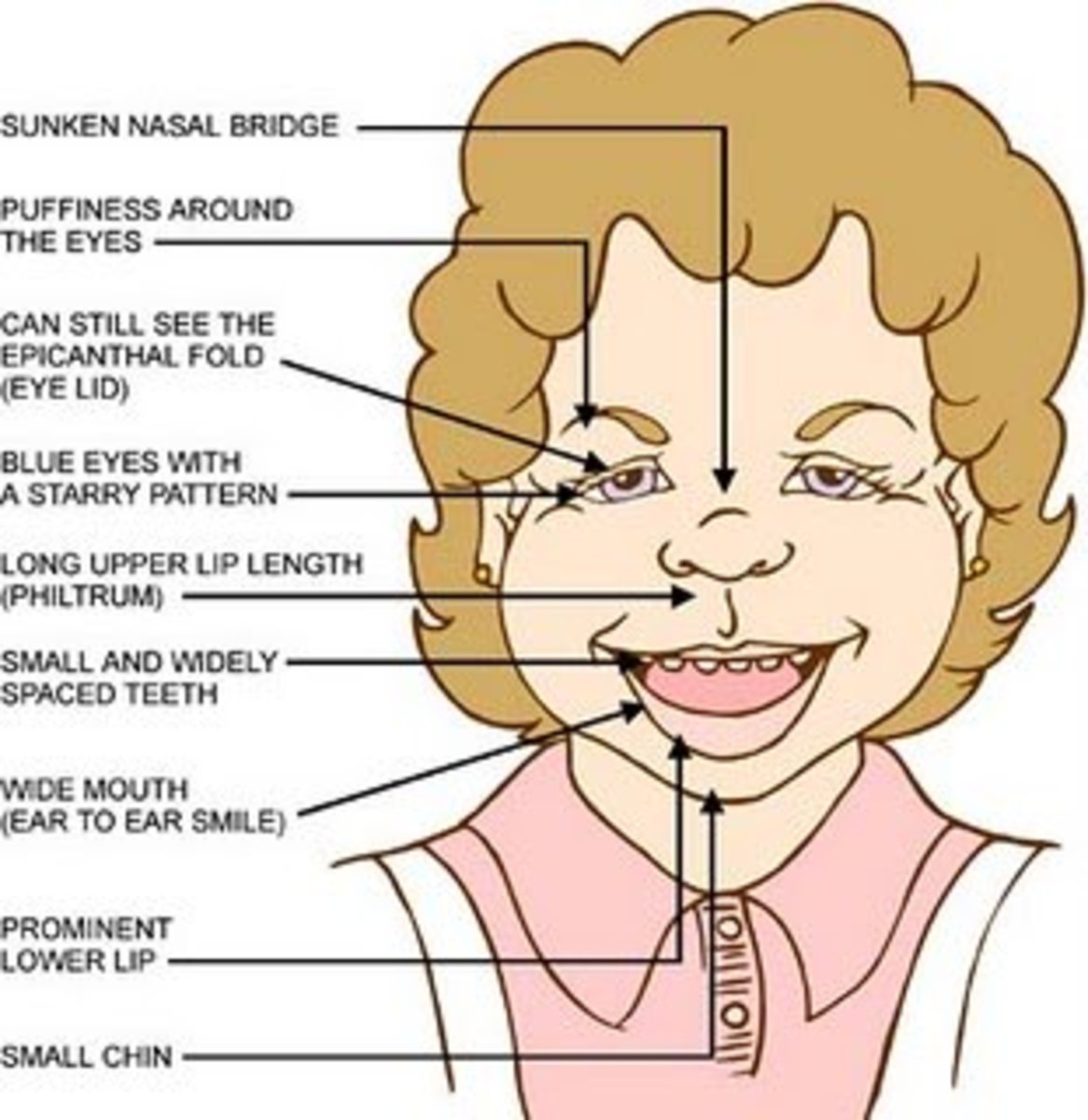Understanding Williams Syndrome

Gene Deletion Profoundly Affects Mental and Physical Development
What is Williams Syndrome? A sunny smile, a garrulous and expressive disposition, and a complex array of problems: physical, mental, and neurological.
Williams Syndrome is a microdeletion disorder, resulting from an accident of meiosis. Approximately 25 contiguous genes are deleted from chromosome 7. Those 25 genes have a profound impact on the growth and development of the brain, as well as on the body's connective tissue.
Many of the physical symptoms are the result of haploinsufficiency for a single substance: elastin. A substantial minority of Williams Syndrome patients have a severe heart defect, often SVAS, sometimes pulmonary stenosis. Several other genes in the deletion region contribute to the physiological profile. Common are irregularities of the kidneys, teeth, endocrine, and musculoskeletal systems. Young children may experience colic and hernias and often are unusually sensitive to sound. Abnormalities of muscle tone may be apparent.
It was once thought that Williams Syndrome was very rare, and that almost all 'Williams kids' had some degree of developmental delay. In an age of genetic testing, however, the face of Williams Syndrome is changing.
Mental Characteristics of Williams Syndrome
The disorder has sometimes been described as autistic-like... and sometimes as the polar opposite, or mirror image, of classic autism. People with Williams Syndrome tend toward narrow, focused interests and repetitive motor behaviors. However, these autistic-like behaviors are often paired with gregariousness, empathy, and excessive levels of trust. People with WS may talk locquatiously and pepper their speech with colorful expressions and less common word choices.
Children with Williams Syndrome are often overactive. They may display impaired attention processes, though the disorder is usually not classic ADHD. 'Williams kids' are more likely to have atypical patterns of focus than a pervasive lack of attention. They may have very high levels of focus -- singlemindedness even -- when it comes to their own particular interests!
Music and expressive language are frequent interests, appearing sometimes as talents and other times merely as passions. True giftedness is more apt to occur in music -- probably because music is more fully dissociated from general cognitive function. Some people with Williams Syndrome do have the coordination to play stringed instruments; others must choose different avenues to express their musicality -- singing, perhaps. Spatial sense and motor coordination tend to be quite low. A person with Williams Syndrome might get lost very easily and might have only rudimentary math skills. Stair climbing is a hard-to-master skill in childhood, and handwriting may also prove a struggle.
Anxiety is common, but it follows atypical patterns. People with WS are often fearful of illness or other harm befalling themselves or their loved ones. Social fear however, may be lacking, and, those with WS frequently barrel headlong into situations where they will be hurt. In fact, excessive trust is one reason adults generally don't live alone even when general cognitive functioning would merit it.
Developmental delay was once considered a hallmark of the syndrome. A recent study of 300 children with the full deletion found IQs ranging up to about 115. There are also short/partial deletions, which leave intact one or more genes important for cognitive function. The average IQ for the full-deletion WS tests about 30 points below that of the general population, however, and partial deletions are considered rare.
Of course, when abilities are so scattered across domains, the number the pscychiatrist assigns as IQ may ultimately have very little meaning!
Faces of Williams Syndrome: A Video
Here we meet a group of US children with Williams Syndrome.
Williams Syndrome Slideshow
Here is another Williams Syndrome musical slideshow -- this one from Britain.
- Williams Syndrome Gallery
This musical slideshow features pictures of adults and children with Williams Syndrome.
Recent Research in Williams Syndrome
- Lack of Racial Stereotyping
Typically developing youngsters as young as three will assign more positive words/ judgments to pictures of people from their own race. the results are in from a new social science experiment: Williams Syndrome kids are the first population identifie - Role of STX1A in Intelligence
If you follow the research over time, you see that studies often contradict each other. I think that this isn't, in most cases, the fault of researchers. In the case of partial deletions, scientists are working from a limited sample size. Conclusions - Facial Processing in William Syndrome
People with Williams Syndrome have a larger fusiform area (one of the areas of the brain that processes faces). - Comparing Language Processing in Williams Syndrome and Autism
Recent study shows that electric activity in brain deviates from the norm in opposite ways in Williams Syndrome and autism in response to some language cues. - Role of Limk1
New evidence shows that the gene Limk1, for a time discounted as a major player in the Williams Syndrome cognitive profile, does have a significant impact on brain development.
In-Depth Information
The online book below doesn't reflect the most recent genes research -- at the time STX1A (now thought to be the single most important contributor to mental retardation) was thought not to play a significant role. It is, however, a great source of information about Williams Syndrome.
- From Genes to Clinical Features
In-depth Williams Syndrome research. - Genetics, Cognition, and Clinical Issues
A Williams Syndrome ebook from the Salk Institute.
Video: Williams People
Several young adults with WS share their insights in this excellent video. We hear from their parents as well.
Williams Syndrome Research
There are so many questions about Williams Syndrome: What is the connection between WS and music/ expressive language? How severe are deficits in spatial sense -- and what forms do they take? Which genes in the deletion region are associated with significant alterations of physical or mental characteristics?
Scientists have much to learn from Williams Syndrome!
- Salk Institute WS Research Programs
The Salk Institute is one of the leaders in WS Research. Their web site summarizes research programs and provides contact information for potential participants. - Social and Nonsocial Fear in Williams Syndrome
This study uses brain imaging to posit a reaon for the unusual WS anxiety profile (low social anxiety, high nonsocial anxiety) - Williams Syndrome Across Cultures
From the Salk Institute: An exploration of Williams Syndrome social behavior across multiple cultures. - Affect, Social Behavior, and the Brain in Williams Syndrome
A summation of Salk research in WS sociability - Researchers Continue to Learn From Williams Syndrome
A reader-friendly summation of Williams Syndrome research, with applications for educators. - Science Direct: Dorsal Stream Deficits
People with Williams Syndrome are believed to have spatial problems that selectively target the dorsal stream, as opposed to the ventral stream. This research suggests the problems continue into the adult years. - Spatial Orientation Problems in Williams Syndrome
Experiment suggests that those with Williams Syndrome lack a spatial orientation system that is present in most people from toddlerhood on. - Social Response in Williams Syndrome
Research is uncovering a brain basis for low social/ high nonsocial fear in Williams Syndrome. - MSN: Spatial orientation in WS
People with WS may lack the ability to make a mental image of the geometry of their surroundings. - Reduced fear and aggression
Reduced fear and aggression linked to gene Gtf2ird1. - Neural Mechanisms in Williams Syndrome
A summation of Williams Syndrome research up to 2006, includes results of a number of the 'mouse gene knockout' studies but not the most recent research/conclusions involving the genes involving the gene GTF2IRD1. This team of researchers critiques - Neurological Signs
Neurological signs vary with developmental level/ age. - Response Inhibition in Williams Syndrome
MRI scanning reveals differences in brain activation between Williams Syndrome and the typically developing population during activities requiring response inhibition. - Genetic markers: the eye
Many people with Williams Syndrome have a stellate pattern of the irid. - Partial Deletion
Partial deletion, full phenotype. - 2 Partial Deletion Mice Studies
Scientists created 2 partial deletion mice strains one representing the genes toward the telomeric end, the other the genes toward the centromeric region. - Atypical deletion
An atypical deletion sparing a few genes near the telomeric end. - Hearing Loss in Williams Syndrome
Hearing loss is common, but may be masked. - Brain Structure and Social Language
Study links storytelling behavior with 2 brain structure abnormalities. - Mouse Model Mirrors Social Quirks
Mice deficient in GTF2I don't habituate normally.
Video: A Chorus of Voices - Speaking about Williams Syndrome
In this video, we meet young adults with Williams Syndrome and their parents. Researchers Oliver Sachs and Ursula Bellugi also share their thoughts about Williams Syndrome musicality and personal characteristics.
Video: A Small Child Shares...
With words and body language, this little girl shares quite a lot about Williams Syndrome.
Where To Go For Support - Resources For Those Whose Lives Have Been Touched By Williams Syndrome
- The Williams Syndrome Association
A wealth of resources for parents, teachers, and medical professionals. Find out about new research projects, educational programs, and volunteer opportunities. - Williams Syndrome Foundation
General information about Williams Syndrome. Find out about projects to foster education, music talent, and independent living skills.
Recommended Williams Syndrome Resources


Video: A Child With Williams Syndrome
A mom's tribute to her little girl.
Theme Song
Just a song that, for me, captures a bit of the essence of Williams Syndrome: "Smile an everlasting smile... It's only words, and words are all I have..."
A personal experience, perhaps -- or just a reaction?









